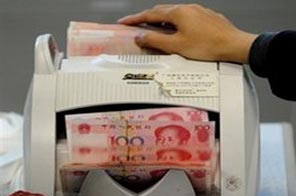China to keep yuan weak until crisis over: experts
BEIJING: China will maintain a weak yuan until its export sector has recovered from the global crisis, prioritising concerns at home despite growing pressure from its major trading partners, analysts say.
The United States and European Union have been pushing China to let the yuan fluctuate, but their calls have so far fallen on deaf ears as Beijing is focused on creating enough jobs to avert social unrest, they said.
"Their focus is domestic issues, not foreign issues," Ben Simpfendorfer, a Hong Kong-based economist at the Royal Bank of Scotland, told AFP.
"They recognise the problem of a weak currency but they have to worry about a large low-income population which has an overwhelming influence on policy-makers."
The yuan, or the renminbi, was re-pegged at around 6.82 yuan to the US dollar in July 2008 after appreciating about 16 percent in the three years since the peg was removed, according to research firm High Frequency Economics.
Beijing made the move as the global financial crisis hit key export markets for Chinese-made goods, triggering the loss of more than 20 million jobs in factories across the country and putting the brakes on economic growth.
While China has acknowledged the need to increase the flexibility of its currency to boost domestic consumption and reduce its reliance on exports, it considers job creation and social stability more urgent, analysts said.
"Until the downturn, there was an appreciation in the yuan and that was a big part of Beijing's strategy to rebalance their economy," Brian Jackson, a senior strategist at Royal Bank of Canada, told AFP.
"That got derailed by the global downturn. Until they see stronger evidence that the external demand situation is better, they are going to keep the currency on hold."
The lack of flexibility in the yuan has angered the United States and Europe, which are slowly recovering from the worst crisis in decades and claim China's exchange rate policy gives its exporters an unfair advantage.
Beijing has kept its currency steady by selling yuan in exchange for foreign assets -- mostly dollars -- and by the end of September had accumulated a record 2.27 trillion dollars in foreign exchange reserves.
Eurogroup chief Jean-Claude Juncker said last week that he, European Central Bank boss Jean-Claude Trichet and EU economic and monetary affairs commissioner Joaquin Almunia would travel to China before year end to tackle the issue.
"We spent quite a long time discussing exchange rates tonight -- it's a problem which has us worried," Juncker, Luxembourg's prime minister, said after a meeting of finance ministers from the 16 countries that use the euro.
The US Treasury this month attacked China for a "lack of flexibility" in the yuan, which has depreciated 6.9 percent against the dollar since February, but stopped short of branding it a currency manipulator.
Washington will have fresh chances to make its case to Beijing at the US-China Joint Commission on Commerce and Trade in the eastern city of Hangzhou this week, and again when US President Barack Obama visits China next month.
Nobel prize-winning economist Paul Krugman said China's "bad behaviour" posed a growing threat to the world by "engineering a large devaluation" of its currency.
"That?s a particularly bad thing to do at a time when the world economy remains deeply depressed due to inadequate overall demand," Krugman said in a column published in the New York Times.
"By pursuing a weak-currency policy, China is siphoning some of that inadequate demand away from other nations, which is hurting growth almost everywhere."
Ken Peng, a Beijing-based economist at Citigroup, said the weak yuan was also hurting Chinese consumers by "stealing" their purchasing power.
"If you really want to adjust domestic imbalances, allowing the renminbi to appreciate is a key factor," said Peng.
"You can't always rely on exports for growth."






